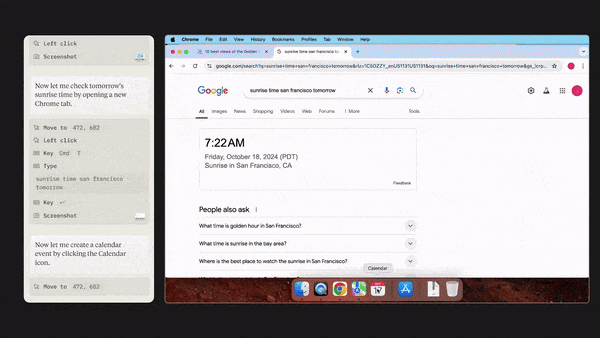🤖 FEK AI NEWSLETTER
Issue 11 | October 25, 2024

by Burak Tunca | read time: 3 min
This week in the newsletter
- Last days to try Scopus AI
- AI models can now use your computer
- Experimenting with an AI-generated podcast for my course
Have a nice weekend and höstlov!
Final days of Scopus AI trial
We are now reaching the final days of Scopus AI trial (October 30th the last day). More details about those tools are available in this earlier newsletter. Feel free to give this tool a try in your literature search, and feel free to send feedback to the library about your experience: research_support@ehl.lu.se.
AI can use your computer now
The biggest news this week came from Anthropic, the company known for its capable AI model series called “Claude”. Anthropic showcased a new feature called “computer use”, in which the AI model uses your computer the way you do—by looking at a screen, moving a cursor, clicking buttons, and typing text.
For instance, you can simply tell the AI model to visit LUSEM events page and tell you about this month’s events. AI will simply open your browser, find the LUSEM events page, read the information, and generate a summary for you.

Needless to say, this level of capabilities opens up new opportunities and threats for education.
Podcast for my course
By now, most of you have heard about the podcast making capabilities of Google’s NotebookLM tool. I know some of you are already uploading academic articles to listen to an audio overview on the go. A major drawback was the lack of customization, but a recent update now allows prompting NotebookLM to influence the output.
Having tried this new feature, I have decided to use NotebookLM to experiment with a podcast for this year’s course in Digital Marketing. For some background, I use 2-3 quite dense academic articles for each lecture. The objective of the podcast episodes is to unpack the general ideas in the readings in an accessible manner. So students can listen to the podcast episodes (during a walk or training) first to get an overview of the subject, and then read the materials in detail to learn more about the specifics.The idea is certainly not to subtitute listening for reading.
NotebookLM has a short prompting window (500 characters). Here is an example prompt I used to generate an episode: “Explain the sources to master level marketing students. Focus on higher-order concepts in the sources. Mention the data collection methods, but do not explain statistics. Focus more on results and contributions. Explain the core theories mentioned in the articles. Explain why it is important to learn about those as future marketing leaders.”
I must say it never got it right the first time. In fact, none of the episodes is the first output – I had to reiterate the prompts several times and the second or third output was way better than the first. Publishing part was super easy with Spotify’s podcaster tools.
I know it will still sound very “robotic” to many of you, but we must remember that this will be the “worst” version you will ever listen to. What NotebookLM or another AI tool will bring us next year is anyone’s guess.
If you would like to give the podcast a try, please see this Spotify link. Would you like to try something similar in your teaching, feel free to send me an email!
|
|
